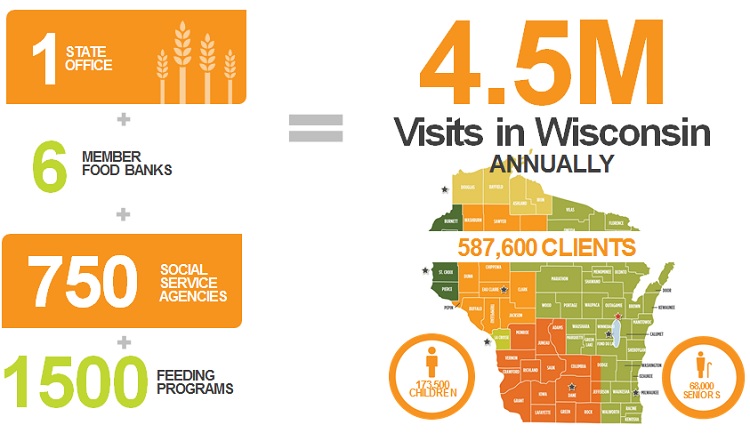Our Impact

Feeding Wisconsin and its member food banks deliver results and community benefits on multiple bottom lines, positively impacting people, the economy, the environment, and the community.
Human Impact
- Over 50 million meals distributed in 2016 to Wisconsin families, helping to provide them with the food and nutrition they need to work, learn, and live healthy lives
- On average, our 750 affiliated agencies and over 1,000 local programs throughout the state provide food to about 600,000 unique Wisconsin residents every year, totaling 4.5 million annual visits
Economic Impact
- Jobs: our participating food banks provide over 100 jobs in Wisconsin, ranging in skill level and job type from grocery and agricultural food sourcer to clerical staff to marketing and PR professional to commercial truck driver
- Warehousing: our food banks maintain four warehouses in the state with 159,000 square feet of warehouse and office space, including a new, state of the art 40,000 square foot facility in Little Chute, WI to better serve northeastern counties. In addition, our food banks also operate four warehouses just across the border in Minnesota, totaling another 100,000 square feet of warehouse.
- Logistics: our food banks run and maintain a fleet of 30 tractor-trailers and refrigerated box trucks, picking up and delivering food to programs throughout the state.
- Investments: our food banks facilitated over $90 million worth of food investments by Wisconsin citizens and businesses over the last twelve months
- Programming: Our statewide FoodShare outreach program helped to bring $9 million in federal food buying dollars into the state. This helped our friends and neighbors purchase the food they need and also provided an additional $16 million in local economic activity.
Environmental Impact
- Diverted over 16 million pounds of edible and nutritious food from the excess stream and connected that food to Wisconsin families in tough times
- Rescued about 3 million pounds of fresh, nutritious, Wisconsin grown agricultural surplus and distributed that food to Wisconsin families
Community Engagement
- Community support is the lifeblood of our food banks. They help us sort and distribute food. They glean and support back office administrative functions. They operate the over 1,500 pantries, meal programs, shelter, and after school programs that engage and serve clients. In 2014, Volunteers donated over 108,000 hours at our food banks. That’s a value of $2.35 million of donated labor time to our organizations.



